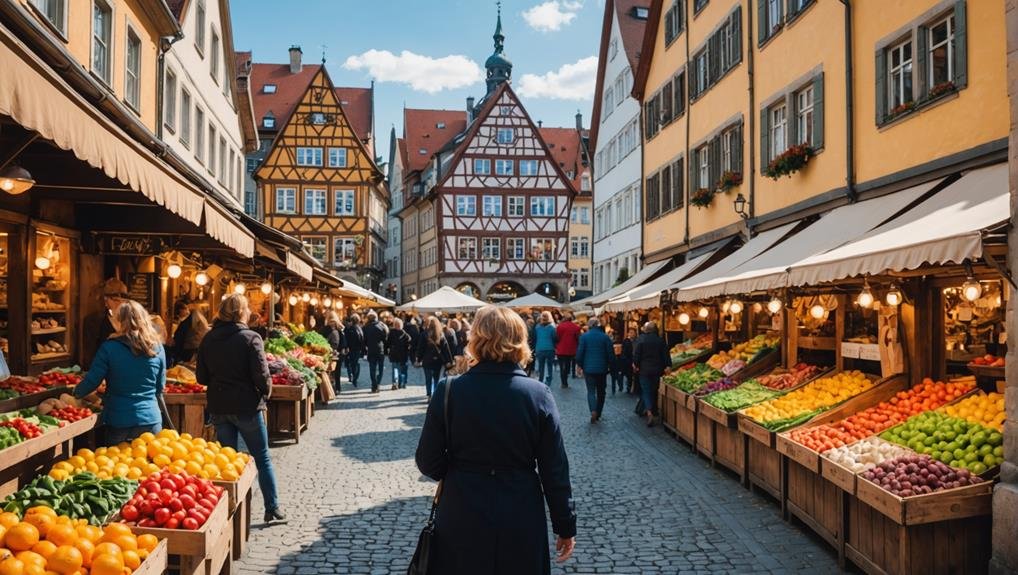Imagine relocating to a foreign country where you don’t speak the language, and everything feels unfamiliar. Caroline did just that when she arrived in Germany as an English teacher. She quickly realized that true adaptation meant more than just learning the language; it required building a strong support network and embracing every opportunity for cultural immersion. Her journey didn’t stop there—she shifted to a corporate role, started a business, and tackled homesickness while integrating into the local community. Are you curious how she thrived in such a challenging environment? Learn more about Successful Stories of Expat Cultural Adaptation.
Key Takeaways
- Caroline’s journey in Germany highlights the importance of cultural immersion and building resilience in new environments.
- Overcoming language barriers through dedication and practice is crucial for successful cultural integration.
- Establishing local friendships and joining community groups provide essential support networks for expats.
- Navigatiexpatsguage barriers and leveraging diverse networks can lead to career advancement abroad.
- Embracing continuous learning and understanding cultural nuances enhances adaptability and resilience for expats.
Carolineexpatsrney in Germany

With a thirst for cultural immersion and new experiences, Caroline embarked on her adventure to Germany, seeking study and personal growth. Starting as an English teacher, she quickly immersed herself in the local culture, facing challenges head-on. Adapting to a new environment demanded resilience, especially when maneuvering cultural differences that could be both subtle and profound.
Caroline’s role as an English teacher provided her with a unique vantage point for understanding German ethos. This initial phase was pivotal in building a solid foundation of cultural awareness. She then progressed to working for a company where English was the corporate language, which eased some initial challenges but required her to adjust continually.
Throughout her journey, Caroline realized the importance of building a support network. Connecting with expats and local expats found that a reliable circle of friends and colleagues was essential for emotional and practical support. This network helped her tackle cultural challenges more effectively.
Her journey didn’t stop there; leveraging her hospitality background, Caroline became self-employed in the Escape Game industry. This new venture showcased her ability to seize opportunities and adjust, making her expat experience a markable story of growth and resilience.
Overcoming Language Barriers
Overcoming language barriers is crucial in adapting to life as an expat. Learning an expat local language is necessary for effective communication and cultural integration. Without it, language barriers can hinder social interactions, making it tough to understand customs and access essential services. These language challenges require dedication and practice, but they’re surmountable.
Start by seeking language learning resources. There are many ways to improve, whether taking formal classes, using language apps, or practicing with locals. Don’t be afraid to make mistakes; they’re part of the learning process.
As your language skills improve, so will your ability to navigate daily life, build relationships, and immerse yourself in the host culture.
Fluency in the local language opens doors to employment opportunities and new friendships, enhancing community engagement and transforming the expat experience from merely surviving to truly thriving.
Overcoming these language challenges will make your life easier and enrich your understanding of the culture around you. Persistence and practice are your best allies in breaking down those language barriers.
Building a Support Network

Establish local friendships and join community groups to build a strong support network. These connections offer emotional support, practical advice, and valuable cultural insights. Engaging with locals and fellow expats will help you feel more connected and less isolated in your new environment.
Establishing Local Friendships
Moving to a new country can be overwhelming, but establishing local friendships is vital to feeling home. Building a support network through local friendships is important for successful expat cultural expansion. With local friendships, you’ll better integrate into the community and gain emotional support and cultural insights from expat friends miexpatack.
Here are three ways to foster these essential connections:
- Engage in Social Activities: Attend local events, join clubs, or participate in social gatherings. This helps you meet locals who share your interests and can become friends.
- Show Genuine Interest: Make an effort to learn about the local culture and customs. People appreciate when you show interest in their way of life, which can open doors to deeper friendships.
- Leverage Shared Interests: Whether it’s a hobby, sport, or a mutual passion, shared interests can be a strong foundation for building meaningful relationships.
Establishing local friendships enhances cultural understanding, boosts language skills, and notably improves well-being. By immersing yourself in the local culture and forming genuine connections, adapting to your new environment becomes a rewarding experience.
Joining Community Groups
Connecting with community groups is essential in building a solid support network when you’re an expat. Engaging in local clubs and attending community events opens doors to meeting like-minded individuals who can make your new environment more welcoming. By joining expat groups, you can connect with others navigating similar challenges, creating a shared understanding that can be remarkably comforting.
Volunteering in community activities is another effective way to foster a sense of belonging. When you contribute to local initiatives, you integrate into the culture and build meaningful relationships that can last a lifetime. These connections can significantly alleviate feelings of isolation and homesickness, making your expat journey smooth.
Moreover, expat groups are tailored to help you meet others in similar situations, offering a platform to share experiences, advice, and support. These gatherings can be a lifeline, providing a sense of community when you’re far from home.
Career Advancement Abroad
You must navigate language barriers and leverage diverse networks when advancing your career abroad. Embrace continuous learning to adapt to new work cultures and seize opportunities for personal growth. Your unique background and experiences can help you excel in these dynamic environments.
Navigating Language Barriers
Language barriers can, at times, significantly hinder your career advancement abroad, affecting how well you communicate with colleagues, clients, and superiors. Expats have different approaches and barriers, but adaptability is key. Improving your language skills can open doors to new job opportunities, promotions, and professional development.
Consider these three strategies to navigate language barriers effectively:
- Language Courses: Enroll in local language courses tailored for professionals. These courses often focus on business terminology, making you more effective in your role.
- Language Exchanges: Participate in language exchange programs where you can practice with native speakers. This improves your language proficiency and helps you understand cultural nuances.
- Immersion Programs: Engage in full immersion experiences where you live and work in an environment where the target language is spoken. This will accelerate your learning curve and enhance your adaptability.
Effective communication is vital for networking, building relationships, and succeeding in a foreign work environment. Overcoming language barriers demonstrates your commitment to personal growth and cultural understanding, making you a valuable asset to any organization. Remember, each step toward language proficiency is closer to achieving success abroad.
Leveraging Diverse Networks
Building diverse networks is essential for career advancement abroad. Connecting paths and varied backgrounds can significantly boost your career growth as an expat. Expanding your network beyond your immediate circle opens new opportunities, collaborations, and mentorships.
When you leverage diverse networks, you gain unique insights and perspectives that can enhance your professional development. Interacting with individuals from different industries and cultures helps you stay informed about industry trends and navigate challenges more effectively. This broadened perspective can be invaluable in establishing a strong professional presence in your new environment.
Consider the following benefits of diverse networking:
| Benefit | Description |
|---|---|
| New Opportunities | Networking opens doors to career advancements. |
| Unique Insights | Gain varied perspectives and knowledge. |
| Collaborations | Work with professionals from different backgrounds. |
| Mentorship | Access to guidance from experienced individuals. |
| Resource Access | Tap into a wider range of professional resources. |
Expanding your connections not only aids in career growth but also enriches your personal experience abroad. Integrating into a diverse professional community builds a support system to help you thrive in your new setting. So, try to connect, engage, and grow your network.
Embracing Continuous Learning
Career advancement abroad hinges on embracing continuous learning and skill development. When you move to a new country, the initial culture shock to adapting can be overwhelming. However, you can turn these challenges into opportunities by focusing on lifelong learning.
- Learn Local Languages and Cultural Nuances: Mastering the local language and understanding cultural subtleties eases communication and demonstrates your commitment to integrating into the new environment. This can greatly enhance your career prospects.
- Build a Diverse Network: Networking with professionals from various backgrounds can open doors to new opportunities. A diverse network offers different perspectives and innovative solutions to workplace challenges, fostering professional growth.
- Expose Yourself to Different Work Cultures: Each country has a unique work culture. By embracing continuous learning, you can adapt and incorporate these new practices into your professional life, making you more versatile and valuable to your employer.
Embracing continuous learning isn’t just about acquiring new skills and enhancing your adaptability and resilience. By doing so, you’ll find that advancing your career abroad becomes a rewarding experience.
Starting a Business

Launching a business as an expat involves Mexico, a great Mexico, requiring a thorough understanding of legal requirements, the right visas, and the ability to navigate the local bureaucracy. When starting a business in a new country, you must be prepared and organized, as these factors greatly influence your success. Cultural adaptation plays a pivotal role in this process. You must understand the business landscape and the cultural nuances that can impact your venture.
Commitment and sacrifice are essential. You’ll face challenges that test your resilience and adaptability. Financial awareness is also vital. Properly managing your finances from the outset can make or break your business. Don’t underestimate the importance of building a strong local network. Connecting with other expats and localexpatspreneurs can provide valuable insights and support.
Utilizing skills and experiences from previous roles can be incredibly advantageous. You are leveraging and applying what you know can give you a competitive edge. Remember, success in starting a business as an expat is about being open to learning and operating in your new environment.
Navigating German Bureaucracy
To navigate German bureaucracy, you need a clear understanding of visa requirements, registration processes, and legal documentation.
Effective documentation strategies, including keeping thorough records and ensuring accurate translations, will save you time and stress.
Don’t hesitate to seek help from experienced expats or legal expats to process.
Legal Requirements Overview
Understanding the legal requirements in Germany is fundamental for any expat looking to expand a business, strengthen local regulations, and help avoid penalties. Maneuvering German bureaucracy can be intricate, but knowing the necessary steps will make the process smoother.
First, you’ll need to obtain the appropriate visas and permits. Depending on your nationality and the nature of your business, this might involve a residency permit or a specific business visa. Researching the exact requirements for your situation is vital to ensure compliance.
Second, legal documentation is key. Germany requires thorough documentation for business registration, including proof of identity, business plans, and financial statements. Verifying all documents are complete and accurate will save you time and potential headaches.
Third, be prepared for industry-specific regulations. Different types of businesses may have additional legal requirements, such as health and safety standards or environmental guidelines. It’s important to familiarize yourself with these to avoid any compliance issues.
Key Steps to Navigate German Bureaucracy:
- Obtain necessary visas and permits: Guarantee you have the correct legal status to operate a business.
- Prepare thorough documentation: Accurate and complete documents are essential.
- Understand industry-specific regulations: Compliance varies by business type.
Seeking professional advice can also help you maneuver the complexities of German bureaucracy more efficiently.
Effective Documentation Strategies
Getting through German bureaucracy can seem overwhelming, but mastering effective documentation strategies will make the process smoother. As an expat, understanding the paperwork for residence permits, work visas, tax registration, and health insurance is pivotal.
Start by gathering all necessary documentation in advance. This includes identification, proof of residence, employment contracts, and financial statements.
Seeking professional advice can save you time and frustration. Immigration lawyers or consultants familiar with German bureaucracy can provide tailored guidance. Always follow official guidelines meticulously; German processes require attention to detail and patience.
Online resources and government websites are invaluable for accurate information. Check these frequently to stay updated on any changes in requirements. Additionally, the local expat community can share their experiences, helping you navigate the paperwork maze more efficiently.
Dealing With Homesickness

While adjusting to life abroad, many expats experience challenges, especially when juggling caregiving roles for children and aging parents. This longing can be intense, as expat individuals individualize their caregiving responsibilities across different systems and time zones. You might feel stressed and disconnected, but there are effective coping methods. Coping TheicopinThe g method emphasizes the adaptation process. Acknowledge your feelings and understand that many ex-pats experience sex pats experience are three strategies to help manage homesickness:
- Stay Connected: Use technology to maintain regular contact with family and friends back home. Video calls, social media, and messaging apps can help bridge the distance.
- Build a Support Network: Engage with local expat communities and social locations. Sharing experiences with others in similar situations can provide comfort and practical support.
- Create New Routines: Establishing routines and traditions in your new environment can foster a sense of belonging. These activities can anchor you, whether it’s a weekly dinner or a local hobby.
Workplace Inclusion Experiences
How do you navigate workplace inclusion as an expat? Many experiences are included at work due to exclusivity and disparities. Effective diversity and inclusion policies are often lacking, making it hard to feel truly welcomed in your professional environment. This is where inclusive leadership comes into play. Leaders prioritizing workplace inclusion can set a welcoming tone and foster a sense of belonging, which is vital for expat cultural expansion.
Overcoming expansion exclusion requires resilience and proactive efforts. You might need to take the initiative to integrate into the team by seeking out colleagues for lunch, joining work-related social events, or participating in team projects. Experiencing workplace exclusivity can hinder your professional growth and overall job satisfaction, making it essential to find ways to connect and feel valued in your role.
Inclusive leadership benefits expats and enhances the entire workplace. Leaders who understand the importance of diversity and inclusion can create policies that make everyone feel valued. As an expat, advocating for inclusive environments can greatly improve your adaptation experience and professional success.
Embracing Cultural Differences

Exploring and embracing cultural differences involves immersing yourself fully in your host country’s customs, traditions, and values. This process begins with an open mind and a willingness to learn. By embracing these cultural differences, you’ll build stronger relationships with locals and feel a deeper connection to your new surroundings.
Steps to Embrace Cultural Differences
- Understand and Respect: Learn about your host country’s unique customs and traditions. Respecting these nuances shows locals that you value their culture.
- Stay Open-Minded: Adaptability is key. Be willing to try new foods, participate in local festivals, and adopt different social norms.
- Engage Actively: Join cultural events, take language classes, and seek opportunities to interact with locals. This active engagement enriches your experience and fosters mutual understanding.
Integration Into Local Communities
Integrating into local communities often starts with a proactive mindset. Engaging in local clubs and events allows you to meet new people and immerse yourself in the culture. Volunteering is another excellent way to give back and connect with locals. Learning the local language is vital; it helps you communicate and shows respect for the culture.
Maintaining connections with family and friends from home is essential for mental well-being. However, prioritizing self-care practices ensures you’re emotionally and mentally prepared for the challenges of adjusting to a new environment. Simple meditation, exercise, and journaling can help you stay grounded.
Here’s a quick guide to help you integrate smoothly:
| Strategy | Benefit |
|---|---|
| Join local clubs | Build social networks and enjoy shared hobbies |
| Master the local language | Enhance communication and cultural understanding |
| Practice self-care | Support mental health and adaptation |
Embracing new cultures and customs enriches your experience and enables you to build meaningful connections. By taking these steps, you’ll find yourself more integrated and comfortable in your new community. Remember, a proactive approach can make all the difference in your cultural adaptation journey.
Conclusion
In your expat journey, expatfindsd that expat finds usage learning, building a solid support network, and actively immersing yourself in the local culture is key. Just like Caroline, tackle challenges head-on and cherish new experiences. By adapting and engaging with your community, you’ll thrive abroad and create a fulfilling life. Remember, each step you take in understanding and integrating into your new environment brings you closer to a successful, enriching expat adventure expat.
FAQs
1. What Is the Success Rate of Expats?
The success rate of expats ending their assignments early varies, ranging from 16% to 40%. You can boost your chances by focusing on cultural adaptation, family support, job satisfaction, and effective cross-cultural communication.
2. What Makes Expatriate Assignments Successful?
You make expatriate assignments successful by preparing thoroughly, getting intercultural training, and building a local support network. Cultivate coping skills and cultural awareness to manage culture shock. Don’t forget repatriation support to ease your return home.
3. What Are the Five Categories That Determine Expatriate Success?
To determine expatriate success, it would be best to weigh job, relationship, individual, organizational, and community factors. Each category is essential in shaping one’s overall experience and effectiveness abroad.
4. What Is the Success of Expatriates?
You measure expatriate success by their cultural adaptation, relationship-building, and professional achievements. They thrive by being resilient, open-minded, and communicative. Embracing diversity and engaging with locals leads to personal growth, career advancement, and cultural integration.

